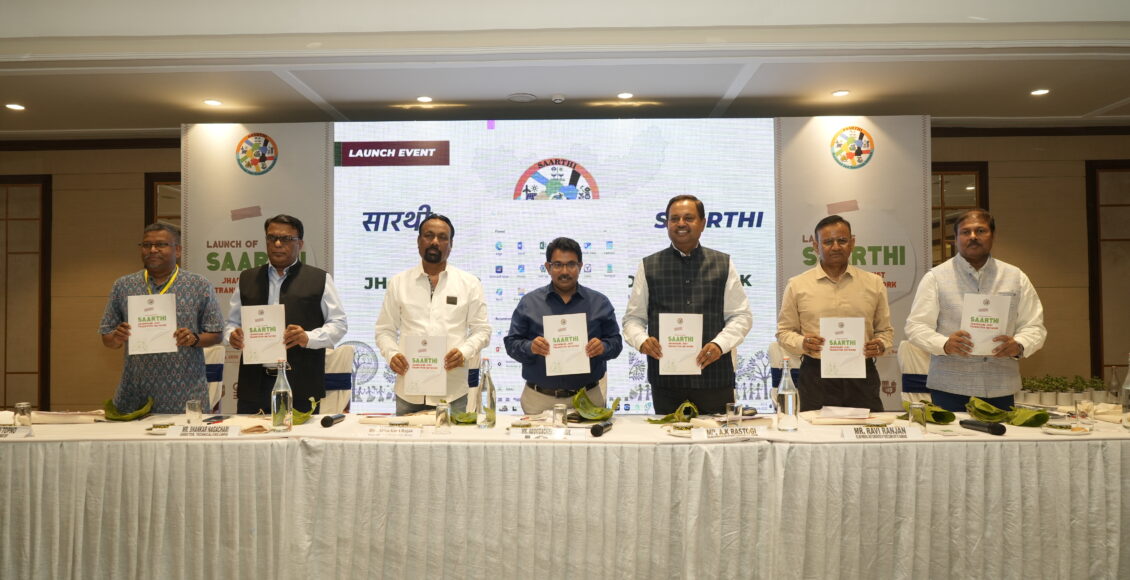30 Civil Society Organisations Launch Jharkhand’s First Just Transition Network, SAARTHI
Aboobacker Siddique Stresses the Need for Inclusive and Sustainable Growth
Ranchi: In a significant step towards sustainable development and social inclusion, over 30 Jharkhand – based civil society organisations came together in Ranchi on Wednesday to launch SAARTHI – the Jharkhand Just Transition Network. This is India’s first civil society-led network dedicated to advancing a just transition—ensuring that the shift to a greener economy is fair and inclusive.
The event was held in two parts. The first session featured expert speakers who shared their insights on Just Transition. In the second session, NGO representatives discussed strategies to strengthen the network and plan future activities.
The SAARTHI network will work closely with the state government, research institutions, local communities, and environmental organisations to promote inclusive and sustainable development in Jharkhand. A special focus will be placed on forest-dependent, mining-affected, and traditionally marginalised communities.
Aboobacker Siddique, IAS, Secretary of the Department of Environment, Forest, and Climate Change, attended the event as chief guest. He highlighted the importance of inclusive development, saying, “Change is inevitable. But development must respect our social and cultural diversity and ensure that no one is left behind—especially the most marginalised. This will require collaboration across many fields and sectors.”
Led by Vanvasi Vikas Ashram and Abhivyakti Sansthan, two Giridih-based organisations with long-standing work among tribal and forest-dwelling communities, SAARTHI will promote community-led initiatives, policy advocacy, and skill-building. In the coming months, the network plans to organise training programs, awareness drives, and dialogues across the state.
Johnson Topno, Director of PHIA Foundation, said, “SAARTHI will help bring community voices into policy decisions. This is a much-needed platform to ensure that development happens with people, not for them.”
A.K. Rastogi, retired IFS officer and Chairperson of the Sustainable Just Transition Task Force, added, “Coal from Jharkhand supports energy needs across India. In 18 districts, the economy is still dependent on fossil fuels. Transitioning to greener options won’t happen overnight. But networks like SAARTHI can help guide this process, and raise awareness about the need for a planned, fair transition.”
Key developments highlighted during his presentation were- The government’s new mine closure guidelines, issued in January 2025, focus on eco-restoration, fish farming, irrigation through mine water, and developing eco-parks. These aim to support both the environment and local livelihoods.
Shankar Nagachari, Technical Director at CMPDI, said NABARD has been active in Jharkhand since the 1990s, promoting sustainable agriculture and climate resilience. “We’re now working with communities to expand tasar silk plantations. Jharkhand has over 250 Farmer Producer Organisations (FPOs), which are giving farmers better market access.”
Gautam Kumar Singh, Chief General Manager of NABARD, welcomed the launch of SAARTHI and said it could play a big role in creating local jobs.
“Jharkhand’s natural resources offer great potential for forest-based livelihoods. Skill training is key—so communities can produce and market quality products like tendu leaves, lac, and mahua effectively.”
Umakant Rajak, MLA of Chandanakiyari-Bokaro, also extended his support to the initiative and praised the role of civil society in promoting equitable development.

